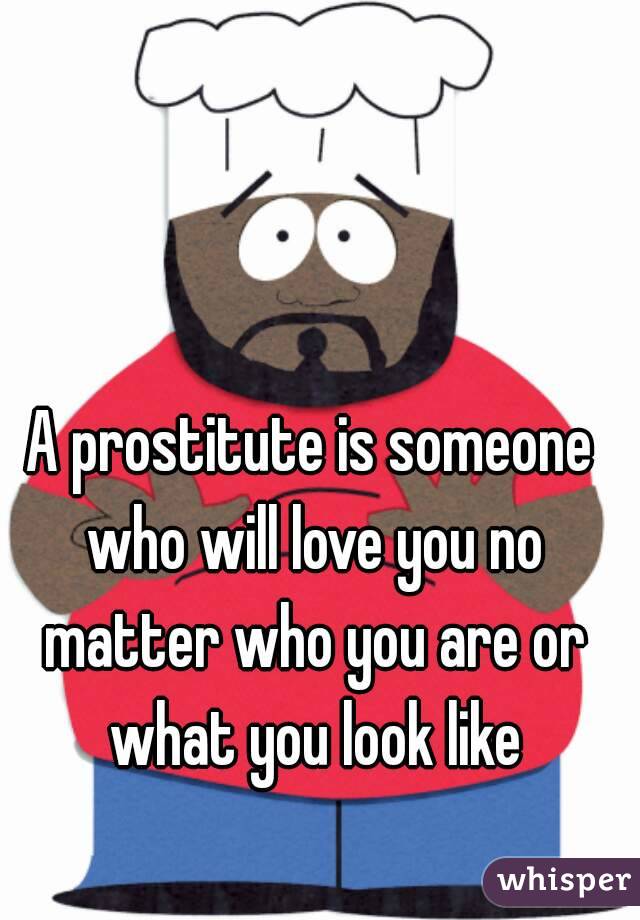Ingresa o regístrate acá para seguir este blog.
@wwaycorrigan
The Oxford English Dictionary defines a prostitute as “A person, in particular a woman, who engages in sexual activity for payment.”
The form of that payment is not explained, but it’s safe to assume that it doesn’t have to be upfront or even actual money. It could be payment in kind, as can happen in many other lines of work. Some journalists and writers, for example, start off working for no more than a few non-cash perks in order to get themselves established.

Not sure about the ‘love’ there … (Image from whisper.)
Of course, quite apart from prostitution, a young or wannabe journalist working in such a way doesn’t deny that he/she is a journalist or trying to be one. That, obviously enough, would be self-defeating in terms of career progression.
What’s more, most if not all people who work in these more accepted professions do so by choice; it’s a safe bet that the majority working in prostitution would rather be in a different, um, position.
Also, considering the stigma attached to the word, some would be horrified to learn — outwardly anyway that is — that what they are actually doing amounts to being a prostitute.
So what, um, boxes (sorry, we’ll stop) does one have to tick to say that she is a prostitute? When you take the payment in kind side of it into account, it’s a grey area indeed, open to a host of interpretation.
However, one important element has to be sentiment. If there is no sentimental attachment, no feeling of physical attraction (let’s not even mention love), then we’d have to say it’s sliding closer to prostitution, or at least the uninterested party is looking for some sort of gain.
Ideally it would all be clear cut. That is to say the more traditional prostitute, where it’s payment upfront or as soon as the job is done.
Or, failing that, at least have it where both parties are left in no doubt as to the state of play: “I see that you are interested in me but I have no interest in you. However, I’m not in the best financial position right now so in return for having sex with me I will extract as much as I can from you in terms of financial assistance, in whatever form. Agree?”
The problem occurs when the lines are blurred. A charade of a relationship is maintained so that payments are given for services rendered or to be rendered, services that more than likely would not be made available if this financial assistance wasn’t forthcoming.
Some will ask, with reason, that if the paying party gets what he wants out of it, a satisfied customer so to put it, then where’s the issue? Well there isn’t one really. Just let’s call it what it is: Prostitution. It doesn’t have to be a big deal.
Yet for the ‘charade relationship’ there is a potential problem as the thin veneer comes off it, more than likely ending the pretence.
The thing is, most men like to think they don’t have to ‘pay for it’. However, as has been said before, we pay for it in some way (not always financially), but most of the time it’s not as blatantly obvious as ‘traditional’ prostitution.
Basically, if desire and sentimental attachment are missing in any relationship, you have to ask what’s the point of it?
This brings us back to that earlier suggestion: If both parties feel they’re getting something out of it, occasional pleasure for the man, the woman some payment, monetary or otherwise (maybe even some pleasure as well), then on it can go.
It’s all about how it’s perceived. Accentuate the positives and everything can be fine, within reason. The key, perhaps, to any relationship that.
___________________________________
Facebook: Wrong Way Corrigan – The Blog & IQuiz “The Bogotá Pub Quiz”.




I think sugar babies are prostitutes too. However, they reframed the concept of prostitution.
- Me gusta
0
- No me gusta
0
ReportarCalifica:
For sure, and there are plenty of them about as well (on a related topic, from a couple of years back: http://bit.ly/1CGTtLM).
- Me gusta
0
- No me gusta
0
ReportarCalifica:
I liked the puns…
- Me gusta
0
- No me gusta
0
ReportarCalifica:
Thanks Alfonso! The plan was to make light of what was a frustrating experience!
- Me gusta
0
- No me gusta
0
ReportarCalifica: